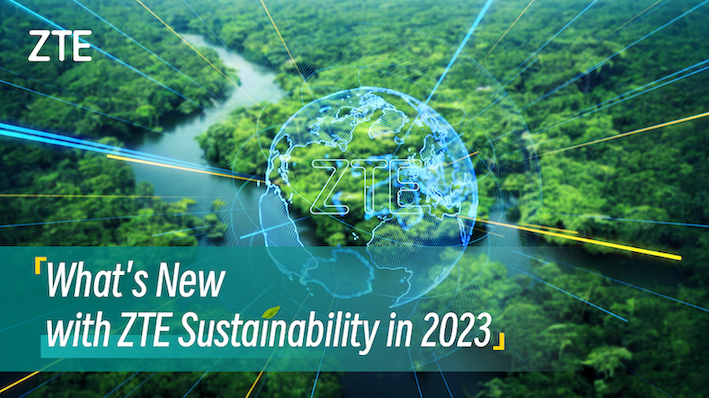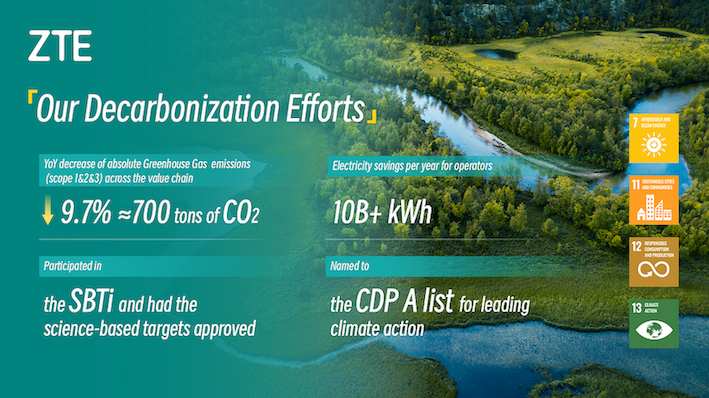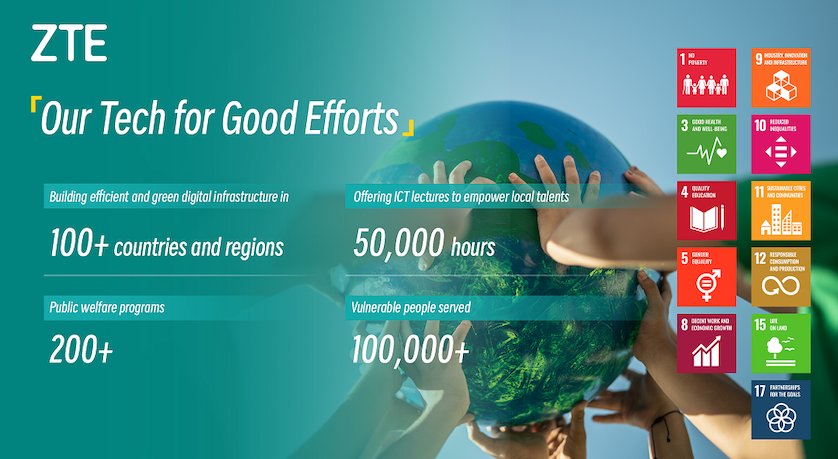ZTE Corporation (0763.HK / 000063.SZ), a global leader in ICT solutions, has unveiled its 2023 Sustainability Report, highlighting significant strides in green innovation, social contributions, and corporate governance. Marking its 16th consecutive year of sustainability reporting, ZTE continues to demonstrate an unwavering commitment to integrating sustainable practices into its core business operations.

ZTE: Pioneering green innovation and a sustainable digital economy
ZTE’s CEO, Xu Ziyang, emphasizes the company’s dedication to the intersection of technology and humanity. “We uphold the Human-Centric and Tech for Good philosophy, and constantly explore new fields, applications, and value of digital and intelligent transformation,” Xu stated. “Together with global customers, partners, investors, and people from all walks of life, we will build a digital and intelligent ecosystem, making efforts and contributions to promote industrial revolution, accelerate social development, and enhance the well-being of all humanity.”
ZTE’s sustainability report highlights the company’s continuous innovation in digital intelligence and its commitment to investing in key technology sectors, including chipsets, algorithms, and digital infrastructure.
By 2023, ZTE had filed over 89,500 patent applications and secured more than 45,000 granted patents globally. These innovations have been instrumental in advancing “phygital” (physical + digital) solutions across industries, driving high-quality development in diverse sectors.
Driving Green Innovation for a Sustainable Future

A cornerstone of ZTE’s sustainability efforts is its commitment to green innovation, aimed at creating an eco-friendly ecosystem. The company’s green development strategy is rooted in four key dimensions: green operations, green supply chain, green digital infrastructure, and green empowerment, all contributing to the global goal of net-zero emissions.
In 2023, ZTE achieved a remarkable 9.7% year-on-year reduction in absolute greenhouse gas (GHG) emissions across its value chain. The company also reported a 14.58% reduction in the physical intensity of GHG emissions during the use and maintenance phases of its telecom products, alongside a 700% increase in photovoltaic power generation capacity.
ZTE’s green supply chain initiatives included a carbon reduction audit for over 150 suppliers, resulting in a 3.26% reduction in carbon emissions intensity through green logistics efforts. The company’s Heyuan Base earned the designation of “National Green Factory,” further solidifying ZTE’s leadership in sustainable manufacturing.
The report also reveals that ZTE holds over 650 green patents and has conducted carbon footprint assessments for 101 products, covering all categories. The company’s green digital infrastructure initiatives have helped global operators save over 10 billion kilowatt-hours of electricity annually, making a significant impact on energy conservation.
In a significant milestone, ZTE’s greenhouse gas reduction targets were approved by the Science Based Targets Initiative (SBTi) in April 2024. This approval aligns with the 1.5°C temperature rise limitation pathway and sets the company on a course to achieve net-zero emissions by 2050.
ZTE also launched its “ZTE Zero-Carbon Strategy” white paper, outlining its roadmap for contributing to global zero-carbon efforts.
Bridging the Global Digital Divide with Tech for Good

ZTE’s commitment to “Tech for Good” extends beyond environmental sustainability, as the company actively works to bridge the global digital divide. Executive Vice President and Chief Operating Officer Xie Junshi highlighted ZTE’s role in building high-performance networks across over 100 countries and regions, ensuring that the benefits of digital transformation reach even the most remote communities.
As part of its efforts, ZTE has pledged to construct ICT infrastructure in Least Developed Countries (LDCs), Landlocked Developing Countries (LLDCs), and Small Island Developing States (SIDS) by 2025. The company also plans to dedicate 50,000 hours of ICT training globally, helping to build local workforce capabilities and promote meaningful global connectivity.
ZTE’s SPIRE 2.0 strategy, introduced in 2023, is central to enhancing supply chain resilience and product quality. The company also prioritizes employee welfare, providing an average of 144.7 training hours per employee in 2023, and has been recognized as a Global Talent Magnet Employer by LinkedIn.
Earlier this year, ZTE, along with its fiber broadband provider Converge ICT Solutions Inc., officially unveiled the WiFi7 ONU which is seen to significantly advance the evolution of the local network infrastructure.
Strengthening Corporate Governance for a Resilient Future
ZTE’s 2023 Sustainability Report underscores the company’s emphasis on corporate governance, internal controls, and business continuity management (BCM). ZTE successfully passed the re-certification audit of its anti-bribery management system, maintaining the ISO 37001 certification. To ensure operational resilience, the company also conducted 214 joint Business Continuity Plan (BCP) drills in high-risk areas.
As a member of the United Nations Global Compact (UNGC) and the Global Enabling Sustainability Initiative (GeSI), ZTE has received multiple accolades for its sustainability efforts, including being named in the FTSE4Good Index Series and Fortune China ESG Impact List for consecutive years.
Looking ahead, ZTE remains committed to its vision of “Enabling Connectivity and Trust Everywhere,” driving digital innovation that benefits all industries and contributes to sustainable development worldwide.
For more details on ZTE’s 2023 Sustainability Report, visit ZTE Sustainability.





